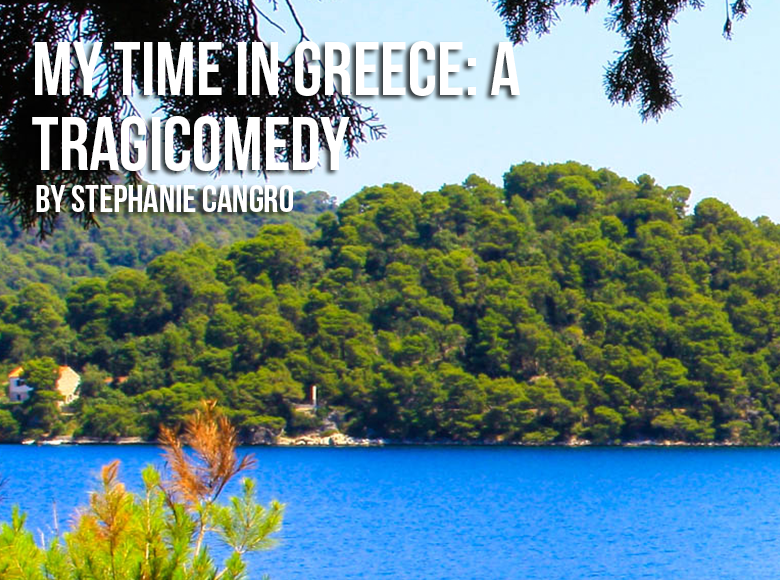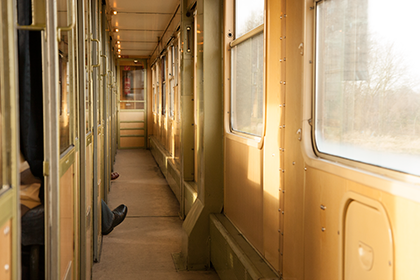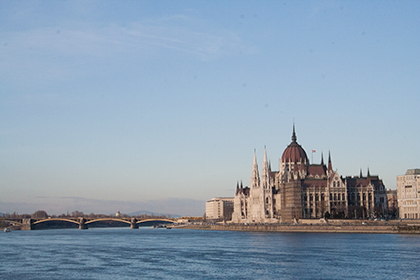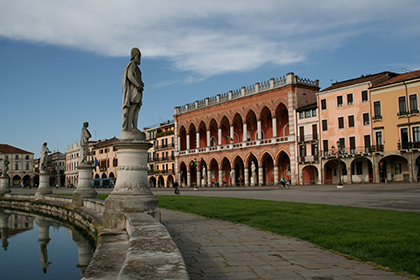There are three times in my life that I’ve found myself sleeping in the street—the first two were spent camping out for SNL tickets (Kanye and Mr. J. Timberlake, respectively). The third time was… different.
Picture it: Athens, March 2008. My friends and I had been studying abroad in different European cities, but our spring breaks lined up perfectly; we planned to spend the time touring the city and hopping around the Cyclades. Money was tight, but we had enough for semi-decent hostels, ferry tickets, museum entries, and beach days. We were excited, though perhaps a little naïve (despite living in countries with foreign languages, this would be the first time any of us encountered an entirely different alphabet). But when we landed in Athens our first night, our enthusiastic faces clearly didn’t make an impression on the hostel’s clerk—it was far too late, according to Greek time, for check-in. We were told to come back in the morning. Looking back, this should have been our first hint that the trip would be a near-disaster.
With no idea of where to go, or what to do, we started wandering around, eventually finding a touristy-looking café in the middle of a town square. We had to order something before the staff would let us sit, so we tried in vain to understand the menu. Honestly, I’m not even sure we did—I think that the staff just took pity on us after a really long time and brought us some coffee. By this point it was getting to be super late, maybe about 2 am, so we settled at tables outside and took turns sleeping. Some stray dogs wondered over (they’re all over Athens) and sniffed around us, but generally left us alone. One golden mutt curled up under a neighboring table.
Hours later, as the sun began to come up, the café staff kicked us out—it was understandable, but we still had nowhere to go. We started walking again and our new dog friend tagged along, clearly getting a kick out of showing us his (her?) favorite places (an empty fountain, a specific corner, and an alley). Finally, it was time to check in. This would be the last time I would ever sleep on the street, but it’s still not the rock bottom of the story.
The next few days were a blur—I remember seeing the Parthenon and touring the Acropolis, but soon enough we were on our way to our first island, Mykonos. We were all sleep-deprived at this point, but ready for some sun and blue water.
Instead, Mykonos was freezing. We had booked two rooms in the cutest hostel on the island—think those adorable white huts—but ended up huddled together in just one for warmth. Because going to the beach was out of the question, we spent our days touring the island, trying to find any place we could stay indoors without being bothered—more often than not, this meant the island’s sole Starbucks. A few days passed like this. Tempers were definitely running high, but we were all still trying to make the best of the situation, assuming that things would be better at our next destination, Santorini.
Except we never made it there.
When the day finally came to pick up our ferry tickets, we were in for a surprise: because this was Greece—the land of democracy, muses, outrageous leopard print clothing, and doing completely illogical things on total whims—our ferry was going to head to the neighboring island of Syros instead, and we’d have to switch ships once we got there. Okay, not a big deal, right?
Wrong. (Are you sensing the theme here?)
Let’s just skip over the part where the hostel owner’s son took a detour through a drug deal while driving us to the port (we didn’t want to be there, but whatever, we survived). Eventually, we made it to Syros just fine. But—wait for it—soon found out that we weren’t going to be leaving anytime soon. Apparently, during our 90 minutes trip, the winds had escalated and all ferries had been cancelled. Great.
Nowhere to go. Nowhere to sleep. Again. Except now we’re all about to kill each other.
Desperate, we hightailed it to the closest internet café (this was pre–international smartphone data plans, folks) and began searching for hostels. But Syros, as we soon learned, is basically the business center of the Greek Isles. It’s a place where people really only go for work, so our only options were Greek alternatives to the Holiday Inn—comparatively cheap, but still more expensive than we had hoped. Resigned, we pooled our money together and checked into the cheapest option.
With nowhere to go, nothing to see, and barely any money left to spend, we spent the next few days at the pier, hanging out with seagulls and checking with the ferry office nearly every hour. Finally, after three days, we became desperate: there was a single ferry leaving that evening to head back to Athens—the first to leave at all since we’d arrived—and we resignedly purchased tickets. From the ridiculously crowded boat, we called ahead to our next Athenian hostel (the plan had always been to stay in Athens the night before our return flights) and advanced our arrival by two days.
Impossibly, once back in Athens, our situation only grew worse—the next hostel was a new level of gross. I’m pretty sure we all cried ourselves to sleep the first night: I definitely refused to touch the blanket that had been provided, opting instead to wrap my legs inside of my sweatshirt. In the morning, after being frustrated with having to pay for shower water (cold water, mind you, not hot), we left to wander the city again.
Slowly, a new realization came upon us: if you’ve seen one Greek statue, you’ve seen them all. So instead of revisiting the tourist hotspots we had already seen, we hunted out English movie theatres, book stores, and small restaurants. We fell into a pattern of seeing double-features at an old, cheap theatre and reading silently while camped out in yet another Starbucks.
Looking back now, nearly six years later, I’m almost glad it happened the way it did. It’s quite possibly the last extreme experience I’ll ever have without a smartphone to save me. If the trip hadn’t turned out horribly, I wouldn’t have discovered my appreciation for Dickens (A Tale of Two Cities was one of the only English-language books we could find—Twilight was the other) or have pushed myself that far out of my comfort zone. Moreover, the experience of the trip definitely made our friendships stronger—without the typical creature comforts we were used to, each of us was forced to confront the best and worst of each other.
And, to be honest, I just really love telling this story and knowing that I was made stronger for the experience.

Photo by Gali Levi-McClure


